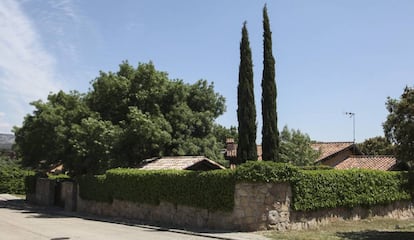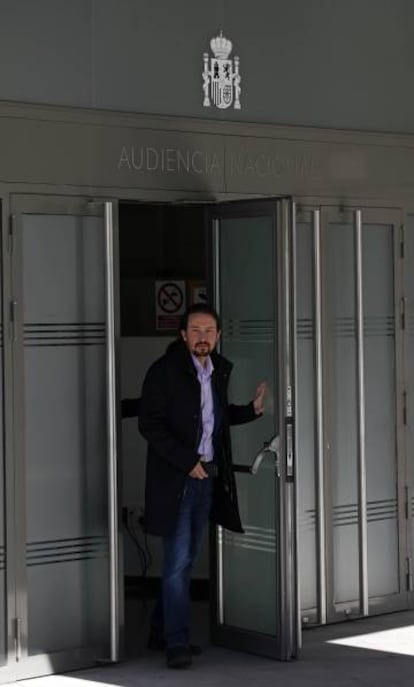Hackers broadcast live stream of police camera at Podemos leaders’ home
The device that had been installed at the house of Pablo Iglesias and Irene Montero had to be replaced by the Civil Guard after the anti-austerity party was made aware of the intrusion

Spain’s leftist Podemos party filed a complaint on October 17 reporting that a security camera installed outside the family home of the group’s leader, Pablo Iglesias, had been hacked, and that footage was being streamed live on a publicly accessible website.
The Interior Ministry, which was first alerted about the incident, has confirmed the report. The security camera had been installed by the Civil Guard on a property owned by Podemos chiefs Pablo Iglesias and his partner Irene Montero in Galapagar, northwest of the Spanish capital.
Details about the security operation had been leaked just a few days before the camera was hacked
The law-enforcement agency had to reset the camera and install new devices to prevent hackers from accessing the images again.
Investigators have traced the hackers back to a server in Singapore, but have been unable to identify the perpetrators, said a ministry spokesperson.
Three days before the complaint, the party had received an anonymous message with screenshots of the website broadcasting live images of the Galapagar property.

Details about the security operation approved by the Interior Ministry to protect the politicians’ home had been leaked just a few days before the camera was hacked.
In recent weeks, Iglesias has denounced police operations carried out under the previous Popular Party (PP) administration aimed at spying on Podemos and creating fake evidence to support claims of illegal funding by the anti-austerity party. Iglesias also said that the current Socialist Party (PSOE) administration has not done enough to end such foul play, which he alludes to as “the cesspit of the state.”
Podemos was also apparently targeted by the so-called “Patriotic Brigade,” a group of police officers who allegedly engaged in irregular activities during ex-prime minister Mariano Rajoy’s first term in office in an attempt to damage the reputation of the PP’s political rivals. Last week, Podemos sources said they will ask an investigating judge to accept as evidence several audio recordings revealed by the online dailies El Confidencial and Moncloa.com in which a police chief inspector named José Angel Fuentes Gago asks former Venezuelan minister Rafael Isea for help to prevent Podemos from coming to power in Spain.
Founded in March 2014 as a protest party during Spain’s economic recession, Podemos has been the target of several espionage operations, some of which were launched by the Spanish Interior Ministry. Attempts to find evidence that might damage the party’s image began ahead of the general election of December 20, 2015, when Podemos was soaring in opinion polls. Spaniards ultimately made the party the third-largest political force in parliament, undermining the traditional two-party system dominated by the PP and the PSOE.
The Galapagar home
Pablo Iglesias and Irene Montero were heavily criticized in May 2018, when news emerged that the leaders of the anti-austerity party Podemos had purchased a €600,000 luxury property outside Madrid. Social media users dug up an old clip of Iglesias in 2015 criticizing politicians who "go to live in houses and isolate themselves." The party held a referendum on whether Iglesias and Montero should remain in their roles after the controversy. Grassroots members voted for them to stay.
Soon after that, the police circulated a report about Podemos that suggested illegal party financing through Iran. At this time, Iglesias was earning money from appearances on Hispan TV, an Iranian-owned TV station. Spain’s High Court (Audiencia Nacional) and Supreme Court have both shelved complaints made by third parties against Podemos on the basis of this report.
Later, another investigation by the Patriotic Brigade held that Iglesias had made $272,000 (€242,400) from the Venezuelan government of Nicolás Maduro and that he was keeping the funds in a bank in the Grenadines, a tax haven. The Venezuelan informer who provided this unverified information was granted a special residency permit by the Interior Ministry.
English version by Susana Urra.
Tu suscripción se está usando en otro dispositivo
¿Quieres añadir otro usuario a tu suscripción?
Si continúas leyendo en este dispositivo, no se podrá leer en el otro.
FlechaTu suscripción se está usando en otro dispositivo y solo puedes acceder a EL PAÍS desde un dispositivo a la vez.
Si quieres compartir tu cuenta, cambia tu suscripción a la modalidad Premium, así podrás añadir otro usuario. Cada uno accederá con su propia cuenta de email, lo que os permitirá personalizar vuestra experiencia en EL PAÍS.
¿Tienes una suscripción de empresa? Accede aquí para contratar más cuentas.
En el caso de no saber quién está usando tu cuenta, te recomendamos cambiar tu contraseña aquí.
Si decides continuar compartiendo tu cuenta, este mensaje se mostrará en tu dispositivo y en el de la otra persona que está usando tu cuenta de forma indefinida, afectando a tu experiencia de lectura. Puedes consultar aquí los términos y condiciones de la suscripción digital.








































